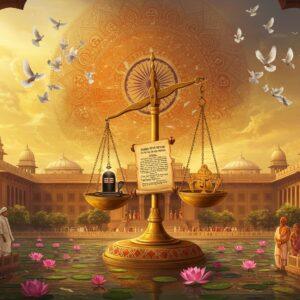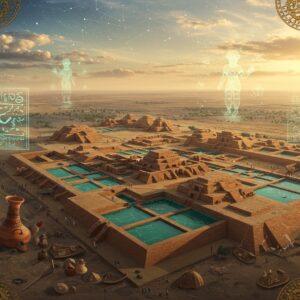
Every family in India has stories, don’t they? Whispers from our grandparents and great-grandparents about a time when the Union Jack flew over our land. This period, often called the British Raj, wasn’t just a chapter in a history book; it was a defining era that reshaped the very soul of our nation. While the formal British Raj began in 1858 after the first war of independence, British influence had been growing since the 1600s through the East India Company, which gained significant control over North India by 1803. This long chapter finally closed with our hard-won freedom in 1947.

The Changing Face of Power: Political Shifts Under British Rule
The arrival of the British brought a whirlwind of political changes. They slowly but surely dismantled the old systems of maharajas and nawabs, bringing everything under a single, centralized administration. Policies like the ‘Doctrine of Lapse’ were used to annex princely states, changing the map of India forever. While they introduced the Indian Civil Service and a new legal system based on English law, it often felt distant and disconnected from our traditional ways of justice.
But from this pressure, a new spirit was born. The desire for Swaraj, or self-rule, began to burn brightly in the hearts of Indians. This led to the formation of the Indian National Congress in 1885, a platform where our leaders began to voice the aspirations of a nation. Events like the Partition of Bengal in 1905 were met with widespread protests, showing that the spirit of India could not be easily divided or conquered. This growing wave of nationalism was the first step on the long road to independence.
Our Economy’s Transformation: A Double-Edged Sword
Economically, the colonial period was a time of immense upheaval. India, once known for its fine textiles and rich crafts, was slowly turned into a supplier of raw materials like cotton and jute for factories in Britain. The very hands that wove beautiful fabrics were now forced to supply the raw ingredients for foreign industries. This had a devastating impact on our local artisans and traditional businesses.
The British did build a vast network of railways, telegraphs, and postal services. While their main purpose was to transport resources and maintain control, these networks also connected our vast country in a new way. However, this progress came at a great cost. The economic policies led to a significant drain of wealth from India to Britain, and mismanagement often resulted in terrible famines that left deep scars on our collective memory.
Society in Transition: New Ideas and Old Roots
The British era also brought significant social changes. The introduction of Western education created a new, educated Indian middle class. This class, armed with new ideas of liberty and justice, would eventually lead the charge for independence. Great social reformers like Raja Ram Mohan Roy emerged, challenging age-old customs and advocating for progressive changes like women’s education.
Amidst all this change, there was also a beautiful cultural renaissance. As Western influence grew, there was a renewed interest in our own art, literature, and philosophy. People began to rediscover the richness of our heritage, from classical music and dance to the deep wisdom of the Vedas. It was a time of holding on tight to our cultural roots, even as the winds of change blew hard. This resilience is a testament to the timeless strength of our traditions, a strength beautifully explained in guides to Hindu Philosophy.
Keeping Our Traditions Alive Through Turbulent Times
Through all these decades of struggle and change, what kept the spirit of India alive? It was our unwavering faith, our vibrant festivals, and the sacred rituals performed in our homes. These traditions were our anchor, connecting us to our ancestors and our culture. At Poojn.in, we are dedicated to helping you keep this sacred flame burning brightly.
- Authentic Pooja Samagri: In every era, our pooja rituals have been a source of immense strength and peace. We provide a complete range of traditional pooja items, ensuring that the customs passed down to us, even during the British period, continue with purity and devotion. Explore our extensive collection of Pooja Samagri.
- Divine Idols and Jewellery: The presence of a deity in the home has always been a source of comfort for Indian families. Our collection of Holy Idols and Holy Jewellery is crafted with devotion, helping you create a sacred space that reflects the enduring faith that saw our nation through its most challenging times.
- Sacred Utensils for Your Rituals: The utensils used in our poojas are not just objects; they are carriers of tradition. Our selection of Holy Utensils is designed to honour the sanctity of your rituals, connecting you to the age-old practices of our land.
For any guidance or to find the perfect items for your spiritual needs, you can always connect with us at 03369029784 or on WhatsApp at 9476142738.
The Legacy That Lingers: A Conclusion
The British era left behind a complex legacy of both progress and pain. It unified our country administratively but also divided it. It brought modern infrastructure but at the cost of economic exploitation. Yet, through it all, the period forged a strong sense of national identity and a collective will for freedom. Reflecting on this time allows us to honour the resilience, struggle, and unwavering spirit of our ancestors who fought to give us the free India we live in today.
Understanding the British Era: Your Questions Answered
Many people often wonder about the real impact of British rule on our country. When we consider its effect on our economy, it’s clear that the focus shifted heavily towards benefiting Britain. Our traditional industries, like handloom weaving, suffered as India was made a market for British goods and a supplier of raw materials. This led to economic hardship for many artisans and a dependency on agriculture, which was also restructured to grow cash crops for export, sometimes leading to devastating food shortages.
Socially, the changes were profound. The introduction of English education created a new class of Indians who were exposed to Western ideas of democracy and liberty—ideas that they eventually used to demand independence. At the same time, this period saw a determined effort to preserve and celebrate our own culture. The legal system was also completely overhauled, with English common law replacing many traditional judicial practices, a system whose structure largely continues today.


